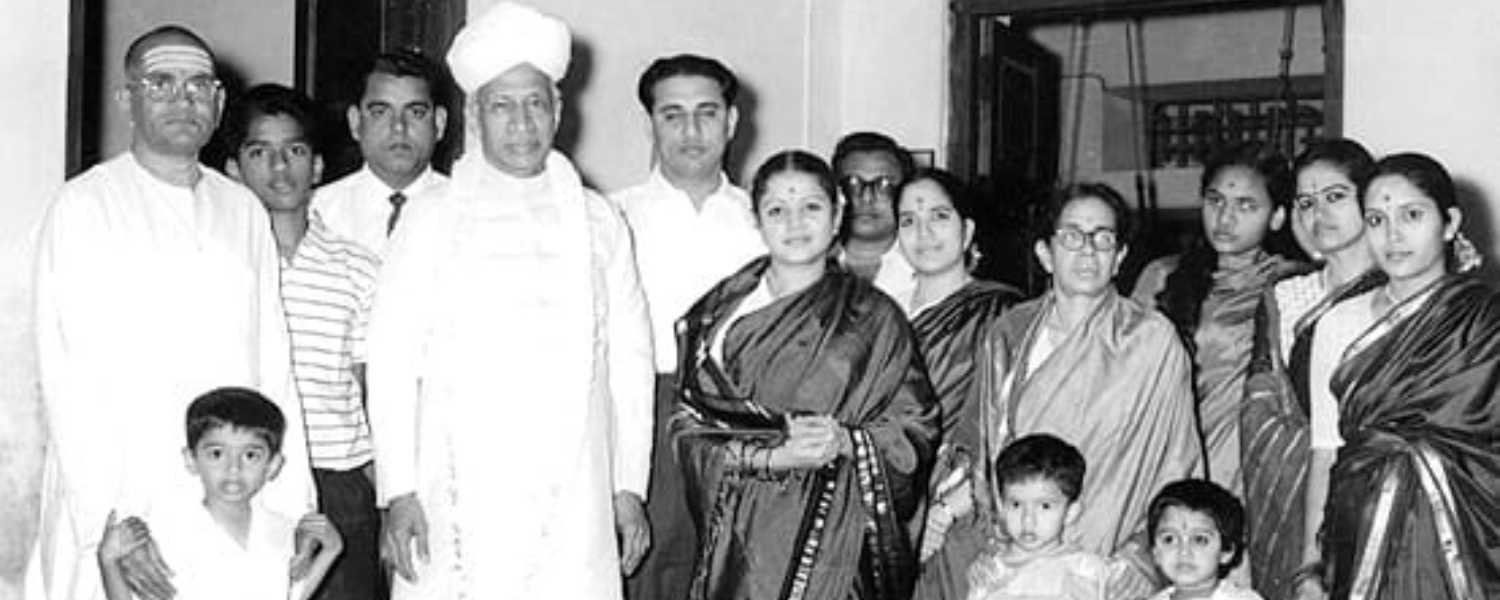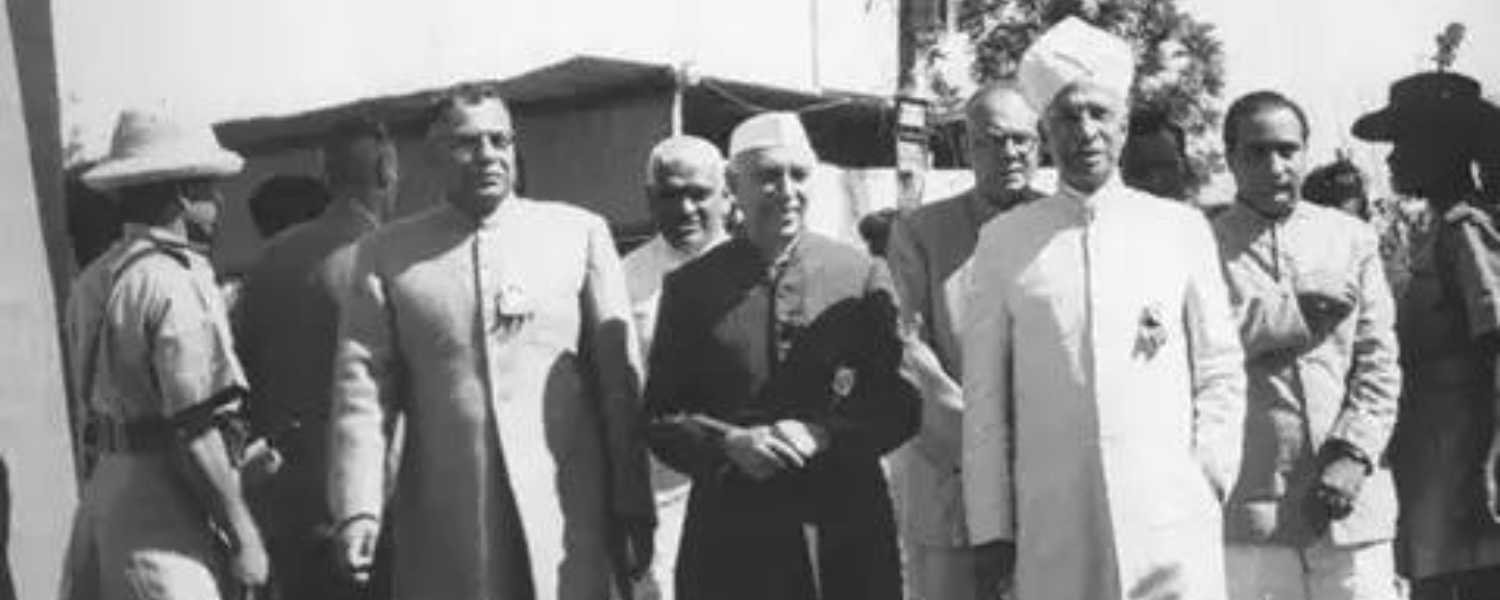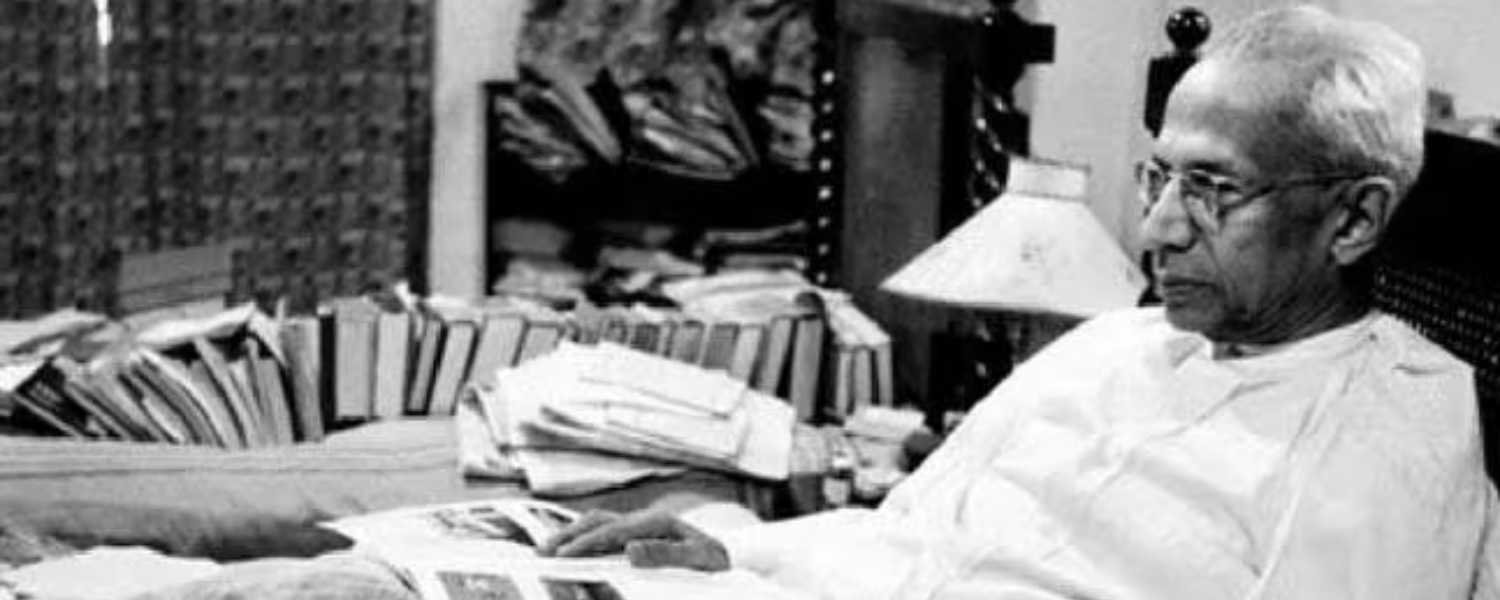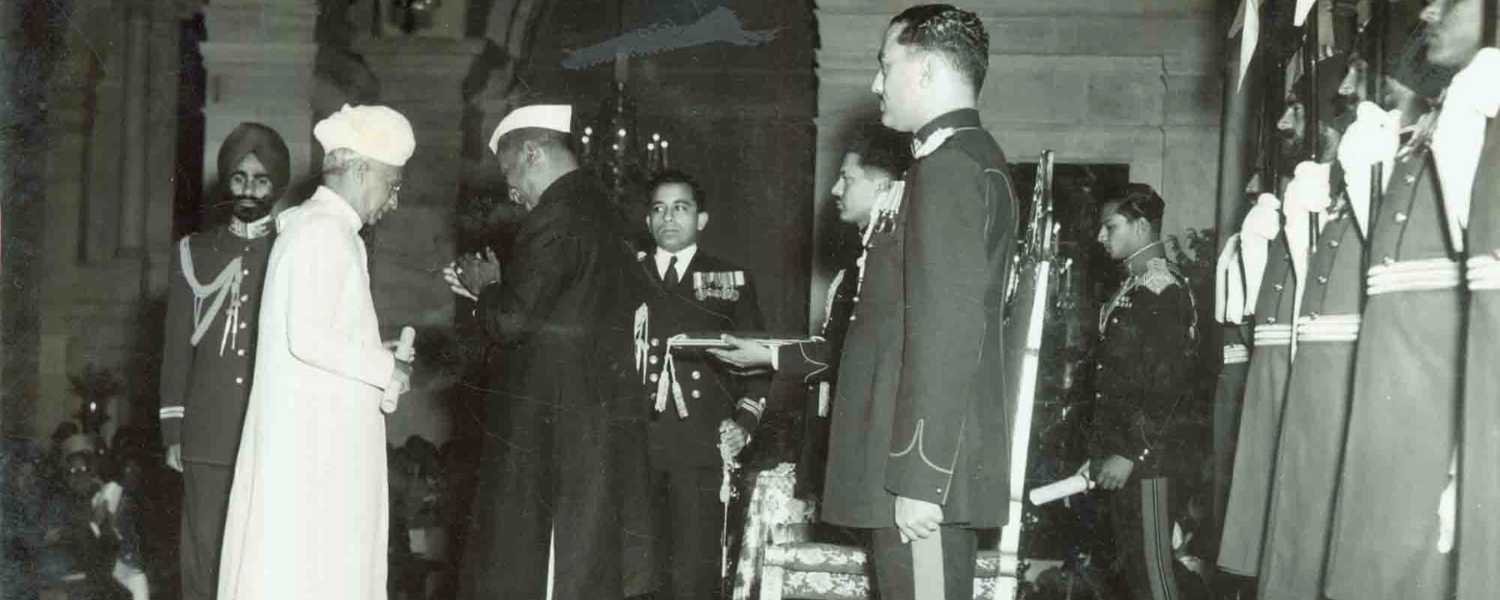Dr. Sarvepalli Radhakrishnan was a renowned scholar, philosopher, and statesman.
He held the esteemed position of the first Vice President of India from 1952-1962 and, subsequently, the second President of India from 1962-1967.
Dr. Sarvepalli Radhakrishnan was born on Sep 5, 1888, in the quaint town of Tiruttani, in the vibrant state of Tamil Nadu, India.
Dr. Radhakrishnan’s contributions to philosophy and education are widely recognized and celebrated.
He is also remembered for shaping modern India’s intellectual and political landscape.
Biography and Context

Dr. Sarvepalli Radhakrishnan’s life journey began on September 5, 1888, in the quaint town of Tiruttani.
Nestled in the then Madras Presidency of British India, which is now part of Tamil Nadu, India.
Born into a modest middle-class family, his father, Sarvepalli Veeraswami, was a revenue official.
Despite his family’s financial constraints, young Sarvepalli’s parents recognized the value of education and ensured he received a solid foundation.
His early schooling took place in Tiruttani, where he imbibed learning fundamentals.
Later, he continued his education at the Lutheran Mission School in Tirupati. During these formative years.
Radhakrishnan’s intellectual curiosity blossomed, setting the stage for his illustrious academic career.
Radhakrishnan’s thirst for knowledge led him to pursue higher education.
He earned a Master’s in Philosophy from the University of Madras, showcasing his academic prowess.
Academic and Political Career

Undeterred by challenges, he embarked on a scholarly journey that would eventually shape the philosophical landscape of India and beyond.
His academic pursuits culminated in a doctoral degree from the University of Calcutta, where he delved into the profound realms of Vedanta.
His thesis, “The Ethics of the Vedanta and its Metaphysical Presuppositions,” reflected his deep engagement with Indian philosophical traditions.
Beyond the confines of academia, Radhakrishnan’s personal life unfolded with the tender bonds of family.
At 16, he entered matrimony with Sivakamu, and together they shared the joys and responsibilities of raising a family.
Their union blessed them with five daughters, grounding Radhakrishnan amidst his scholarly endeavors.
Radhakrishnan’s journey extended beyond the realms of academia into the corridors of political power.
In 1931, he assumed the role of Vice-Chancellor at Andhra University, marking the beginning of his foray into administrative leadership.
Subsequently, he served as the Vice-Chancellor of the University of Delhi, leaving an indelible mark on the academic institutions he led.
His political trajectory gained momentum as he became a member of the Indian Constituent Assembly, contributing to the foundational principles of independent India.
In 1952, he ascended to the position of the first Vice President of India, cementing his stature as a statesman of unparalleled wisdom and integrity.
Throughout his life, Radhakrishnan’s contributions garnered widespread acclaim and recognition.
His accolades included a knighthood in 1931 and the prestigious Bharat Ratna, India’s highest civilian award, in 1954.
Despite the accolades, Radhakrishnan remained grounded in his principles, embodying humility and dedication to service.
Dr. Sarvepalli Radhakrishnan’s life story is a testament to the transformative power of knowledge and the enduring legacy of intellectual inquiry.
His journey from humble beginnings to global renown inspires generations and reflects the timeless values of perseverance, humility, and intellectual curiosity.
Philosophy of Sarvepalli Radhakrishnan

A profound synthesis of Eastern and Western thought marks Sarvepalli Radhakrishnan’s philosophy.
Emphasizing the importance of spiritual experience and the reconciliation of diverse religious truths.
At the core of his philosophy lies the unity of all existence and the essential harmony of religions.
Radhakrishnan’s philosophical outlook was deeply rooted in the teachings of Vedanta.
A Hindu philosophy school that emphasizes Brahman’s ultimate reality and the interconnectedness of all beings.
He saw Vedanta not as a sectarian doctrine but as a universal philosophy that could offer insights into the nature of reality and the human condition.
Harmony of Religions and Unity of Existence
One of Radhakrishnan’s key ideas was the concept of the “Absolute,” which he believed to be the ultimate reality underlying all existence.
He argued that different religious traditions could approach this Absolute, each offering a unique perspective on the divine.
Radhakrishnan also emphasized the importance of spiritual experience in the search for truth.
He believed that direct experience of the divine was essential for genuine religious understanding, transcending mere intellectual knowledge or ritualistic practice.
In addition to exploring Hindu philosophy, Radhakrishnan was deeply influenced by Western thinkers such as Plato, Plotinus, and Bergson.
He saw parallels between their ideas and those of Vedanta, particularly in their emphasis on the transcendent nature of reality and the importance of the spiritual over the material.
Radhakrishnan’s philosophy sought to bridge the gap between East and West.
Highlighting the commonalities between religious and philosophical traditions while respecting their diversity.
He advocated for a dialogue between cultures that could lead to a deeper understanding of the human experience and the nature of reality.
Overall, Sarvepalli Radhakrishnan’s philosophy reflects a profound commitment to the pursuit of truth, the value of spiritual experience, and the quest for unity in diversity.
His ideas continue to inspire scholars and seekers of wisdom worldwide, reminding us of the richness and complexity of the human quest for meaning and understanding.
Radhakrishnan Birth

Dr. Sarvepalli Radhakrishnan entered the world on September 5, 1888, in Tiruttani, a quaint town nestled within the Madras Presidency of British India.
Tiruttani, located in present-day Tamil Nadu, India, was where Radhakrishnan’s journey began.
His birthplace, though humble, laid the foundation for a remarkable life.
He would lead and have a profound impact on philosophy, education, and public service.
Radhakrishnan Education

Radhakrishnan’s education journey was a testament to his intellect and dedication.
He embarked on his academic pursuit in the late 19th century, when educational opportunities were limited, especially for those from modest backgrounds like his.
Born in a small town in Tamil Nadu, Radhakrishnan’s early schooling occurred in his hometown of Tiruttani and later at the Lutheran Mission School in Tirupati.
Despite the challenges of his family’s financial situation, Radhakrishnan showed remarkable promise as a student, displaying a keen interest in learning from a young age.
His academic excellence paved the way for further studies.
Radhakrishnan pursued higher education at the University of Madras, where he obtained a Master’s degree in Philosophy.
His thirst for knowledge and passion for understanding the complexities of life led him to delve deeper into the realms of philosophy.
Undeterred by the constraints of his circumstances, Radhakrishnan’s academic pursuits took him to the University of Calcutta, where he embarked on his doctoral studies.
It was during this time that he delved into the profound philosophical concepts of Vedanta and its ethical implications.
His doctoral thesis, “The Ethics of the Vedanta and its Metaphysical Presuppositions,” reflected his deep engagement with Indian philosophy and his desire to explore its relevance in the contemporary world.
Radhakrishnan’s educational journey shaped his intellectual growth and laid the foundation for his future contributions as a philosopher, educator, and statesman.
His rigorous academic training equipped him with the analytical tools and philosophical insights to define his scholarly pursuits and shape his worldview.
Throughout his life, Radhakrishnan remained a lifelong learner, continually seeking to expand his understanding of the world and its complexities.
His commitment to education and intellectual inquiry inspired countless individuals, emphasizing the transformative power of knowledge and the pursuit of truth.
Family and Personal Life

Dr. Sarvepalli Radhakrishnan’s family and personal life shaped the man behind his scholarly contributions.
Born into a modest middle-class family on September 5, 1888, in Tiruttani in Tamil Nadu, India, Radhakrishnan was the second son of Sarvepalli Veeraswami and Sitamma.
At 16, Radhakrishnan married Sivakamu, a union that would last a lifetime and bring forth five daughters.
Despite the challenges of balancing his burgeoning career with familial responsibilities, Radhakrishnan was known for his deep love and devotion to his family.
He maintained a close relationship with his wife and children, cherishing moments of togetherness amidst his busy schedule.
Radhakrishnan’s family life reflected his values of humility, simplicity, and affection.
He often found solace in the company of his loved ones, nurturing a harmonious atmosphere at home.
Despite his rising prominence in academia and politics, Radhakrishnan remained grounded, never allowing fame or success to overshadow his familial duties.
Radhakrishnan’s family served as a source of strength and inspiration throughout his life.
Their unwavering support and encouragement propelled him forward during times of challenge and adversity.
Radhakrishnan, in turn, instilled in his children the values of integrity, compassion, and intellectual curiosity, fostering an environment conducive to growth and learning.
Despite his busy schedule and numerous commitments, Radhakrishnan always made time for his family, prioritizing their well-being above all else.
His legacy as a loving husband, caring father, and devoted family man endures, serving as a testament to the importance of nurturing meaningful relationships amidst life’s various pursuits.
Political Career

Dr. Sarvepalli Radhakrishnan’s political career was as illustrious as his academic and philosophical endeavors.
While he was primarily known as a scholar and philosopher, his foray into politics was marked by dedication and integrity.
Radhakrishnan’s political journey began in 1931 when he was appointed vice Chancellor of Andhra University.
This role allowed him to influence educational policies and promote academic excellence.
His tenure as Vice Chancellor was characterized by progressive reforms and a commitment to educational empowerment.
In 1939, Radhakrishnan was appointed vice Chancellor of the University of Delhi, further expanding his influence in the academic sphere.
He emphasized the importance of interdisciplinary studies during his tenure and advocated for greater collaboration between different departments and faculties.
In 1952, Radhakrishnan’s political career reached its zenith when he was elected as the first Vice President of India.
His tenure as Vice President was marked by dignity, grace, and a commitment to upholding the values of democracy and pluralism.
He also served as the Chairman of the Rajya Sabha, which is the upper house of the Indian Parliament.
In this role, he oversaw discussions and consultations with wisdom and fairness.
In 1962, Radhakrishnan was unanimously elected as the second President of India, succeeding Dr. Rajendra Prasad.
As President, he continued to embody the ideals of leadership and statesmanship, eloquently representing India on the global stage and integrity.
Radhakrishnan remained true to his principles of truth, tolerance, and inclusivity throughout his political career.
He was admired for bridging cultural and ideological divides, earning respect from people across the political spectrum.
Radhakrishnan’s political legacy is a testament to his unwavering commitment to democracy, social justice, and human rights.
His life and career inspire future generations of leaders to serve their country with humility, wisdom, and compassion.
Radhakrishnan Death

Dr. Sarvepalli Radhakrishnan’s passing marked the end of an era for India.
After a lifetime of intellectual and political service, he breathed his last on April 17, 1975, in Chennai, India.
The nation mourned his death and regarded him not only as a scholar and statesman but also as a symbol of integrity and wisdom.
Radhakrishnan’s health had declined in his final years, but his spirit remained indomitable.
Even in his frailty, he continued to inspire those around him with his resilience and optimism.
His death was a loss for India and the global community of scholars and thinkers whom his ideas and ideals had touched.
Radhakrishnan’s funeral was solemn and attended by dignitaries, intellectuals, and ordinary citizens.
Tributes poured in worldwide, highlighting his contributions to philosophy, education, and public service.
They laid him to rest with full state honors, a fitting tribute to a man who had dedicated his life to serving his country and humanity.
Though Radhakrishnan has left us, his legacy endures in the hearts and minds of people worldwide.
His writings inspire new generations of thinkers, and his ideas remain relevant to contemporary debates.
And his example serves as a guiding light for those who aspire to make a positive difference.
Awards and Honors

Throughout his lifetime, people widely recognized and honored Dr. Sarvepalli Radhakrishnan for his contributions to philosophy, education, and public service.
He received many awards and honors for his outstanding achievements and remarkable societal impact.
Here are some of the notable awards and honors bestowed upon him:
1. Knighthood (1931)
The British Crown knighted Radhakrishnan in 1931 in recognition of his scholarly contributions and service to education.
This honor highlighted his growing reputation as a leading intellectual and educator.
2. Bharat Ratna (1954)
In 1954, India awarded Dr. Sarvepalli Radhakrishnan the Bharat Ratna, its highest civilian honor.
He received this prestigious honor in acknowledgment of his exceptional contributions to philosophy, education, and public service.
Radhakrishnan’s dedication to promoting knowledge and fostering harmony between cultures earned him this esteemed recognition.
3. Order of Merit (1963)
In 1963, the British government bestowed one of its highest civilian honors upon Dr. Sarvepalli Radhakrishnan.
This rare honor underscored his global impact as a philosopher and statesman, transcending national boundaries.
4. Peace Prize of the German Book Trade (1961)
In 1961, Radhakrishnan received the Peace Prize of the German Book Trade in recognition of his efforts to promote peace, understanding, and mutual respect among nations.
This prestigious award reaffirmed his stature as a visionary leader and advocate for international cooperation.
5. Soviet Land Nehru Award (1968)
The Soviet Land Nehru Award honored Dr. Sarvepalli Radhakrishnan in 1968 for his significant contributions to literature and philosophy.
This award recognized his profound influence on intellectual discourse and his role in fostering cultural exchange between India and the Soviet Union.
6. Templeton Prize (1975)
In 1975, they posthumously awarded Radhakrishnan the Templeton Prize for his endeavors to enhance our comprehension of spirituality and its relevance to contemporary society.
This prestigious award highlighted his enduring legacy as a philosopher and spiritual leader, inspiring generations to explore the deeper dimensions of human existence.
These awards and honors represent a fraction of the recognition bestowed upon Dr. Sarvepalli Radhakrishnan during his lifetime and beyond.
His remarkable achievements continue to inspire and resonate with people worldwide, affirming his enduring legacy as a scholar, philosopher, and statesman of unparalleled distinction.
Conclusion
Dr. Sarvepalli Radhakrishnan’s legacy continues to inspire people around the world.
His philosophy of education, which emphasized the holistic development of individuals, remains relevant in the modern era.
His profound contributions to philosophy and spirituality have imprinted an enduring legacy on the intellectual terrain of both India and the global community.
For More People-Related Blogs, subscribe to us now!
FAQ
Q1. What is Dr. Sarvepalli Radhakrishnan’s full name?
A. Dr. Sarvepalli Radhakrishnan’s full name is Sarvepalli Radhakrishnan.
This name, widely known and respected, encapsulated his identity and contributions to philosophy, education, and public service.
Q2. What is Dr. Sarvepalli Radhakrishnan’s date of birth and death?
A. Dr. Sarvepalli Radhakrishnan entered the world on September 5, 1888, in the vibrant state of Tamil Nadu, India, a region also known for its scenic Hill Stations in Tamil Nadu and departed on April 17, 1975.
These dates are pivotal moments that encapsulate his journey from modest origins to leaving a profound and lasting impact on society.
Q3. Why celebrate Teachers’ Day on Dr. Sarvepalli Radhakrishnan’s birthday?
A. In India, people celebrate Teachers’ Day on September 5th.
Dr. Sarvepalli Radhakrishnan’s birthday is to honor his educational contributions.
As a distinguished teacher, he emphasized educators’ importance in shaping society, making his birthday a fitting occasion to celebrate all teachers.
Q4. What are some famous quotes by Dr. Sarvepalli Radhakrishnan?
A. One of Dr. Sarvepalli Radhakrishnan’s famous quotes is, “The true teachers are those who help us think for ourselves.”
This quote demonstrates his faith in education’s transformative influence and the vital role teachers play in nurturing critical thinking and independent learning.
Q5. Where can I find a photo of Dr. Sarvepalli Radhakrishnan?
A. You can find photos of Dr. Sarvepalli Radhakrishnan online or in books about his life and work.
Many educational institutions and libraries also display his photographs as a tribute to his legacy in education and philosophy.

